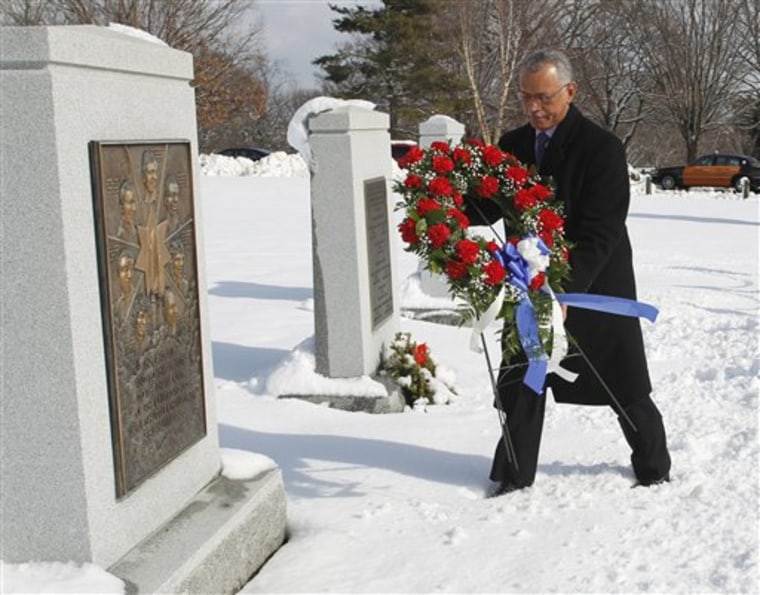The White House and NASA paused on Thursday to remember more than a score of astronauts who were lost in the line of duty.
The space agency's Day of Remembrance — which is always observed on the last Thursday of January — has special meaning this year. Friday marks the 25th anniversary of the shuttle Challenger launch disaster.
Flags flew at half-staff at NASA centers nationwide. In addition, NASA officials laid wreaths at various memorials to honor the dead, including at the Kennedy Space Center Visitor Complex.
In a statement issued by the White House, President Barack Obama reflected on the loss of Challenger's crew as well as other astronauts who "made the ultimate sacrifice in support of NASA missions throughout the agency's storied history."
"Fifty years ago, a young president facing mounting pressure at home propelled a fledgling space agency on a bold, new course that would push the frontiers of exploration to new heights," Obama said. "Today, on this Day of Remembrance, when NASA reflects on the mighty sacrifices made to push those frontiers, America’s space agency is working to achieve even greater goals. NASA’s new 21st-century course will foster new industries that create jobs, pioneer technology innovation, and inspire a new generation of explorers through education — all while continuing its fundamental missions of exploring our home planet and the cosmos."
Obama called on Americans to honor the fallen astronauts "by dedicating ourselves to a better tomorrow" and continuing "their valiant journey toward a more vibrant and secure future."
NASA's three most famous space tragedies occurred within days of one another, but years apart:
- Three astronauts were killed in the , during preparations for the first launch of the Apollo program. The disaster led to design changes in the Apollo spaceship over the year and a half that followed. The astronauts who were lost included Gus Grissom, Ed White and Roger Chaffee.
- Seven astronauts died in the . The disaster was blamed on O-ring seals that were not designed to stand up to the freezing temperatures on launch day. Those who died included commander Dick Scobee, pilot Michael Smith, educator-astronaut Christa McAuliffe, Greg Jarvis, Ron McNair, Ellison Onizuka and Judy Resnik. The tragedy led to more design changes in the solid rocket boosters.
- Seven more shuttle astronauts died in the . That disaster was blamed on foam insulation debris that flew off the shuttle's external fuel tank during its ascent. NASA made extensive design changes and intensified its efforts to reduce and track foam debris. The fallen astronauts were commander Rick Husband, pilot Willie McCool, Michael Anderson, David Brown, Kalpana Chawla, Laurel Blair and Israel's Ilan Ramon.
NASA also paid tribute to astronauts who lost their lives in airplane crashes while on duty. Four astronauts — Theodore Freeman, Charles Bassett II, Elliot See and Clifton Williams Jr. — were killed in accidents involving NASA T-38 training jets.
U.S. Air Force astronaut Michael Adams died in the breakup of his X-15 rocket plane in 1967, and Air Force astronaut Robert Lawrence Jr. was killed in the crash of an F-104 Starfighter during a training flight. Astronaut Sonny Carter was among those who died in a commercial airplane crash in Georgia in 1991 while on NASA business.
"The legacy of those who have perished is present every day in our work and inspires generations of new space explorers," NASA Administrator Charles Bolden said in a statement Thursday. "Every day, with each new challenge we overcome and every discovery we make, we honor these remarkable men and women."
Bolden took part in wreath-laying ceremonies at Arlington National Cemetery in Virginia.
